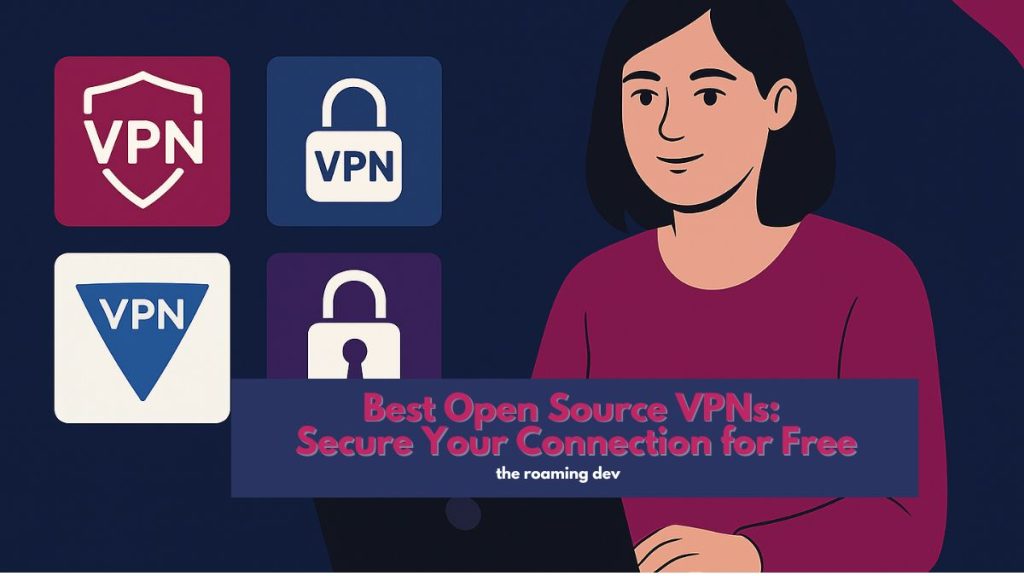VPNs play a key role in protecting your data from cybercriminals and advertising networks. They usually don’t cost much and are easier to use.
However, if you are not interested in paying for a VPN, then you have plenty of open-source alternatives to choose from.
These VPNs are an attractive option for anyone who wants more customization options.
They will work for you if you are looking to alter or view the source code. In some cases, you can even set up your own VPN with open source alternatives.
So, if you are looking for freely available options that you have total control over, then this guide is for you.
We will recommend the best open source VPN on the market. But before we do that, let’s understand the need for open source VPNs, their advantages, and their risks.
Why Use an Open Source VPN?
Using open source VPNs offers many compelling reasons, but mainly online security and privacy. These VPNs shield users from unauthorized intruders looking to steal sensitive information.
The good thing with open source VPNs is that they allow for transparency and customization, meaning you can tailor your VPN experience.
Open-source VPNs, just like other open source software, are supported by a community of users.
What it means is that when someone finds a way to improve the program, it is shared with everyone. The good thing is that most of them are free, but some require a paid subscription, usually at the enterprise level.
Keeping in mind their nature, the best open source VPNs can be complicated to set up. In some cases, it might require an expert-level knowledge of VPNs to maintain.
But if you are just looking to use them without much adjustment or configuration, then they are as straightforward as your commercial VPNs.
Advantages of an Open Source VPN
There are several advantages to using the best open source VPN. Firstly, it offers transparency, letting users inspect the source code for possible weaknesses and vulnerabilities.
Secondly, it offers customization to users. Users can adapt their open-source VPN to their specific needs and preferences.
Cost-effectiveness is another benefit of using open-source VPNs. They are not only open source but also free for users; thus, they are an accessible choice for many online users.
In addition to this, these VPNs usually have an active and passionate community of contributors who continuously improve and update the software.
In a way, it ensures that the software stays current and robust, keeping up with emerging threats.
Risks of Using Open Source VPNs
As with any technology, open-source VPNs are not without potential risks and shortcomings.
One of the major downsides of these VPNs is that they lack professional customer support offered by commercial VPNs. Such support is crucial whenever there are technical issues.
There is also the issue of varying levels of security expertise. This can lead to wrong configurations or modifications to the VPN software, thus leading to vulnerabilities.
On top of this, there might be delays in updates. Not all open source VPNs receive constant updates, which may leave them susceptible to unpatched security flaws.
With this in mind, users need to be extra careful when assessing a particular open source VPN’s reputation, especially the type of community support it receives. This will help them mitigate unwanted risks.
The Best Open Source VPNs
1. OpenVPN
OpenVPN is undoubtedly one of the best open source VPNs on the market. The software is available on nearly all platforms and offers reliable performance.
It is also popular because it allows users or system admins to customize their own VPN network whenever needed.
Some of the outstanding features of OpenVPN include an administrator dashboard to monitor the system and even control it. It also allows users to choose their host locally or on the cloud.
Besides this, it supports multiple authentication methods, including LDAP, 2FA, PAM, and Active Directory, among others.
That is why many network devices allow using OpenVPN in their configuration.
2. FreeLAN
Most people just require their VPNs for one or a few reasons. If that is one of you, then you will love FreeLAN. It comes without the extras and is free to use.
We also believe it is the best open source VPN because it supports client-server and peer-to-peer architecture.
Moreover, it works on all major platforms, including Windows, Linux, and Mac. Some of the great features of FreeLAN include seamless integration with any code you write.
It is possible because you can build the GUI yourself. It is also built using C++, so it offers great performance.
Perhaps the one that stands out the most is that it tries to maintain a minimalist design and functionality, with only a few important features.
3. OpenSwan
OpenSwan is an IPsec integration for Linux and offers support for most extensions like IETF drafts and RFC related to IPsec. These include X.509 digital certificates, IKEv2, and NAT traversal.
OpenSwan stands out as a Linux VPN that is included in multiple distributions like Red Hat, Fedora, Gentoo, and Debian (Wheezy).
It also has an active community and a detailed wiki that can help with installation problems, configurations, and support of the VPN.
4. SoftEther
SoftEther claims to be the fastest open source VPN, a trait that is usually associated with OpenVPN. So, it is a suitable alternative to OpenVPN.
The software started as an academic project, but it has evolved to be a crucial component of online privacy protection.
Some of the key attributes of this open source VPN are dynamic DNS. This will help you avoid the need for a fixed IP for the DNS server, improving security and reducing the usage of fixed-IP addresses.
5. Libreswan
Libreswan VPN is one of the common VPNs that support major protocols, IKEv1, IKEv2, and IPsec. It is also the best open source VPN because it is built for Linux.
We say so because it uses the DDNS crypto library and a built-in XFRM IPsec stack.
Another unique thing about this open source VPN is that it comes ready to use on Red Hat Linux distros. It is also compatible with iOS, FreeBSD, and Linux 2.4-4.x.
6. Securepoint
Securepoint is a German-based cybersecurity company that offers firewall routers to its customers.
While they sell these products, they are firm believers in open source VPN.
That is why they offer a free client to download from their website.
The best thing is that you can operate Securepoint VPN with the SSL VPN client in a straightforward manner.
It also supports major protocols like IPSec via X.509 certificate/IKE, L2TP/PPTP, and preshared keys.
7. strongSwan
If you are looking for an IPsec-based VPN, then strongSwan might be ideal for you.
The program supports IKEv1 and IKEv2 and comes with several features, including the Dead Peer Detection (DPD).
This feature helps to solve the problem of dangling tunnels.
Its strongest features are the use of strong encryption algorithms, easy integrations with Linux via the strongSwan Network Manager applet, and full support of IPv6.
It is also among the best open source VPNs because it is usable in all major operating systems.
8. iPig
This open source VPN is ideal for securing older Windows OS (up to Vista).
The iPig Secure Access VPN Server works seamlessly with your firewall software to create an unbreakable network.
It also has 256-bit encryption, so your connection will stay secure.
The good thing about this VPN is that it creates a secure tunnel that protects online communication at any wired network or WiFi hotspot.
9. Tinc
Tinc is one of the unique open source VPNs with functionality.
This free VPN daemon utilizes tunneling and encryption to create an unbreakable network between hosts on the internet.
We love this VPN because of its automatic full mesh routing.
This way, traffic travels directly to the destination without the need to go through intermediate hops. It also easily extends residents’ VPNs with just the addition of a configuration file.
10. Tunnelblick
To close out the list of the best open source VPNs is Tunnelblick.
This free VPN is designed specifically for macOS and comes as ready-to-use software with crucial binaries and drivers.
You don’t need additional installation because you only need to add your own OpenVPN configuration and encryption information.
Frequently Asked Questions (FAQs)
As mentioned earlier, open source VPNs are mostly free to use, offering cost-effective solutions to many users.
However, there might be indirect costs for setting up and maintaining the VPN infrastructure.
This includes maintenance and server hosting costs.
Also note that some open source VPNs offer premium versions with additional support and features for a fee.
Open-source VPNs are generally safe, but this depends primarily on specific software and how it is maintained.
Safety is also influenced by strong encryption, proper implementation, and regular updates.
So, you should be extra careful when selecting open-source software.
These VPNs are generally legal to use. However, their legality might depend on your use of them as well as your location.
Some countries restrict the use of VPNs, while a majority of them allow them, improving privacy and security as well as accessing restricted content.
To be on the safe side, always check the local laws and regulations that guide VPN usage.
Final Thoughts
Online privacy and security is a paramount concern for both individuals and businesses.
Open-source VPNs offer an effective and cost-effective solution to tackle this problem. All the listed open-source VPNs are safe and free to download.
More importantly, they provide developer code for those interested in building their own VPN client. They are ideal for those who want to modify their client side.
The good thing is that the best open source VPNs have the advantage of faster updates and more consistent patches and fixes, thanks to community contribution.
The only issue is that it can be overwhelmingly difficult to deploy if you are new to open source software.
Also Read:



